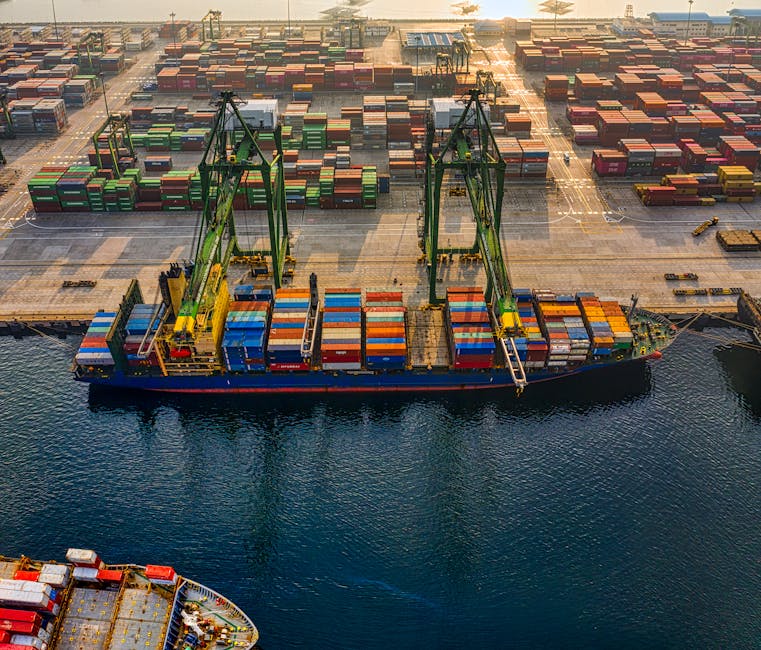In today's changing supply chain landscape, the choice between using a freight forwarder or a broker can significantly impact your logistics operations. Understanding the differences between these two entities is crucial for making informed decisions that align with your business goals and supply chain requirements.
With the global freight forwarding market projected to grow by 1.7% in 2024, the importance of efficient and adaptable logistics solutions has never been more critical. Making the right choice can improve efficiency, reduce costs, and help your business stay competitive. Read on to discover the key differences between freight forwarders and brokers and find out which one is best suited for your needs.
Key Differences Between Freight Brokers and Freight Forwarders
A freight forwarder is a logistics provider that specializes in organizing and managing the transportation of goods on behalf of shippers. They act as intermediaries between shippers and carriers, coordinating various aspects of the shipping process, including booking cargo space, arranging transportation modes, and handling documentation. Forwarders often have extensive knowledge of international shipping regulations, customs procedures such as the Pedimento in Mexico, and trade routes, making them invaluable partners in navigating complex supply chains efficiently.
A freight broker, on the other hand, is a third-party intermediary that facilitates transactions between shippers and carriers. Unlike Forwarders, brokers do not take possession of the freight but instead negotiate rates and contracts on behalf of their clients. Brokers connect shippers with carriers, leveraging their network of contacts and industry expertise to secure competitive pricing and reliable transportation services. They play a vital role in matching shippers' freight with available carrier capacity, optimizing logistics operations and maximizing efficiency.
While both forwarders and brokers play similar roles in the transportation industry, there are fundamental differences between the two. Freight forwarders take responsibility for the movement of goods from origin to destination, offering comprehensive logistics services that encompass freight booking, customs documentation preparation, cargo validation, and cargo tracking. In contrast, brokers act as intermediaries in arranging transportation shipments, focusing primarily on coordinating only transportation movements but not ever having the ability to take possession of cargo. Understanding these distinctions is crucial for businesses seeking to optimize their supply chain management and select the most suitable logistics partner.
The Role of Freight Forwarders and Brokers in Supply Chain Management
How Do Freight Forwarders Operate?
Freight forwarders operate by coordinating the movement of goods from point of origin to final destination, utilizing various modes of transportation such as air, sea, rail, or road. They handle logistics tasks such as cargo booking, customs clearance, warehousing, and distribution, ensuring smooth and efficient transit throughout the supply chain. By leveraging their expertise and industry connections, freight forwarders streamline shipping processes, minimize delays, and optimize freight routes to meet their clients' delivery requirements.
Partnering with a freight forwarder offers numerous benefits for businesses, including access to global transportation networks, expertise in international trade regulations, and personalized logistics solutions tailored to specific supply chain needs. Freight forwarders provide end-to-end visibility and control over shipments, enabling shippers to track their cargo in real-time and proactively manage logistics risks. Additionally, freight forwarders help optimize shipping costs, consolidate shipments, and ensure compliance with customs requirements, enhancing overall supply chain efficiency and competitiveness.
Why Might a Business Choose to Use a Freight Forwarder for International Shipments?
Expertise in International Logistics
Freight forwarders bring unparalleled expertise in managing international logistics. Their role is crucial for businesses shipping goods across borders, ensuring every step of the transit process is seamless and efficient. They don't just book cargo space on ships, airplanes, or trucks; they coordinate every aspect of transportation.
Comprehensive Services
The services provided by freight forwarders go beyond mere transportation. Here are key benefits:
- Documentation Management: They handle all necessary paperwork, including customs documentation and regulatory compliance.
- Packaging Support: Freight forwarders assist with packaging to meet international shipping standards.
- Customs Clearance: Navigating customs formalities can be complex. Freight forwarders simplify this process, ensuring shipments clear customs without delays.
- Consolidation and Storage: They offer solutions for consolidation and storage, optimizing space and reducing costs.
Cost Efficiency
One of the significant advantages is cost reduction. By leveraging their network and expertise, freight forwarders streamline shipping processes and negotiate better rates, thereby reducing freight costs for businesses. This not only saves money but also enhances operational flexibility.
Risk Management and Compliance
In the complex world of international shipping, compliance with various international regulations is critical. Freight forwarders ensure that shipments adhere to all legal requirements, minimizing risks and avoiding potential penalties. Their knowledge of customs duties, tariffs, and import/export regulations is invaluable for a smooth shipping experience.
Simplifying Complex Logistics
International shipments often involve navigating an intricate maze of logistics. Freight forwarders excel in this area by:
- Selecting Optimal Routes: They choose the best transportation routes to ensure timely and cost-effective delivery.
- Handling Multiple Modes of Transport: Freight forwarders can seamlessly integrate different transportation modes, such as sea, air, and land.
- Detailed Goods Tracking: They provide tagging and tracking services, offering transparency and peace of mind as goods move through various nations.
In summary, businesses choose to use freight forwarders for international shipments to leverage their vast expertise, reduce costs, ensure compliance, and simplify the logistical complexities of global trade.
What Types of Shipments Do Freight Forwarders Typically Handle?
Freight forwarders manage a wide array of shipments, covering various transportation modes and destinations. This versatility is what makes them indispensable for businesses engaged in international trade.
Ocean Freight
Freight forwarders coordinate ocean freight, which involves booking container space on cargo ships. These shipments include full container loads (FCL) and less-than-container loads (LCL), allowing flexibility for businesses with varying shipment sizes.
Air Freight
For time-sensitive deliveries, air freight is the preferred choice. Freight forwarders arrange space on commercial flights or dedicated cargo planes to ensure swift transit times, making it ideal for high-value or perishable goods.
Ground Transportation
Shipping over land is equally important. Freight forwarders handle trucking logistics for long-haul and short-haul deliveries, with capabilities to manage full truckload (FTL), less-than-truckload (LTL), and even specialized equipment for oversized or hazardous materials.
Multimodal Shipments
Sometimes, a single mode of transportation isn’t enough. Multimodal shipments use a combination of ocean, air, and ground transportation to optimize costs and transit times. Freight forwarders are experts in coordinating these complex logistics, ensuring a seamless transition between each transportation leg.
Specialized Cargo
Lastly, freight forwarders are proficient in handling specialized cargo. This includes oversized equipment, fragile items, refrigerated goods, and hazardous materials. They ensure that all regulatory requirements are met and that the goods are transported safely.
Supporting Services
Besides transportation, freight forwarders offer a comprehensive suite of supporting services:
- Documentation and Compliance: Ensuring accurate paperwork for international regulations.
- Customs Clearance: Navigating customs processes to avoid delays.
- Consolidation and Storage: Providing warehousing solutions and consolidating smaller shipments to optimize costs.
In summary, freight forwarders adeptly manage a variety of shipment types across multiple transportation modes, offering essential services that facilitate seamless international trade.
What Does a Freight Broker Do?
Unlike freight forwarders, freight brokers focus primarily on facilitating transactions between shippers and carriers. They act as intermediaries, negotiating rates, and contracts on behalf of their clients while connecting shippers with available carrier capacity. Brokers play a vital role in matching shippers' freight with carriers' capacity, optimizing logistics operations, and maximizing efficiency.
Many freight forwarders have the capability to act as a freight broker under their authority.
What Types of Shipments Do Freight Brokers Typically Handle?
Freight brokers primarily manage domestic U.S. shipments. Their focus is on coordinating the transportation of goods across the country, ensuring efficient and timely delivery.
In addition to domestic shipments, freight brokers also handle cross-border freight moving between the U.S., Canada, and Mexico. They ensure that shipments comply with international regulations and facilitate smooth border crossings.
This differentiates them from freight forwarders, who are more involved with international logistics and navigating shipments through various countries worldwide.
So, if your shipment needs to travel within the United States or between the U.S. and its neighboring countries, a freight broker can help.
Why Choose a Freight Broker for Domestic Shipments in the USA, Canada, and Mexico?
Navigating the complexities of domestic logistics can be daunting for many businesses. Freight brokers offer a streamlined solution for managing shipments within the USA, Canada, and Mexico. Here’s why partnering with a freight broker can be beneficial:
Expertise and Efficiency
Freight brokers specialize in connecting companies with the most suitable carriers, whether it’s for truckload, intermodal, or less-than-truckload (LTL) shipments. Their deep industry knowledge ensures that businesses benefit from:
- Competitive Rates: Brokers have established relationships with numerous carriers, enabling them to secure lower rates.
- Time Savings: By handling negotiations and carrier management, brokers free up valuable time for businesses to focus on core operations.
Enhanced Capacity and Flexibility
During periods of high demand, securing freight capacity can be challenging. Freight brokers provide:
- Additional Capacity Options: Their extensive carrier networks give businesses access to more transport options, even during peak times.
- Flexible Solutions: Whether you need ground or air shipping, brokers can arrange the most efficient and timely solutions to meet your needs.
Regulatory Compliance
Navigating regulatory requirements is a significant concern in logistics. Freight brokers help ensure:
- Adherence to Regulations: Brokers maintain up-to-date knowledge of regulations from entities such as the Department of Transportation's Federal Motor Carrier Safety Administration (FMCSA) and Transport Canada. This helps businesses remain compliant, avoiding potential fines and delays.
Improved Shipping Efficiency
Streamlined operations are critical for maintaining timelines and reducing costs. By employing a freight broker, businesses can achieve:
- Optimized Routes: Brokers leverage their expertise to determine the most efficient shipping routes, saving both time and money.
- Reliable Carriers: Established broker-carrier relationships often translate into better service reliability, minimizing the risk of disruptions.
How Cargo Carriers Can Choose Between Freight Brokers and Freight Forwarders
Cargo carriers must weigh flexibility against accountability when deciding between freight brokers and freight forwarders. Each option offers distinct advantages:
- Freight Brokers: Act as intermediaries, connecting carriers with shippers without handling cargo directly. They offer flexibility and diverse shipping options but require thorough vetting to ensure reliability and timely payments.
- Freight Forwarders: Handle end-to-end logistics, taking possession of cargo and ensuring its safe transport. They provide structure, liability coverage, and reliability, often as part of larger organizations.
Making the Choice
- For flexibility and market access: Choose a freight broker.
- For security and accountability: Opt for a freight forwarder.
Carefully vet both options to ensure smooth operations and align with your business needs.
Licensing Requirements for a Freight Forwarder and a Freight Broker
Both freight forwarders and brokers are subject to regulatory requirements and licensing obligations to operate legally in the transportation industry. The Federal Motor Carrier Safety Administration (FMCSA) oversees the licensing and regulation of freight brokers, ensuring compliance with federal transportation laws and safety standards. Freight forwarders must also adhere to licensing requirements set forth by relevant government agencies and industry associations, demonstrating competency and professionalism in managing logistics operations.
Selecting the Right Partner for Your Supply Chain
Evaluating Your Logistics Needs and Objectives
When choosing between a freight broker vs a forwarder, it's essential to assess your logistics needs, objectives, and long-term business goals. Consider factors such as shipping volume, destination markets, service requirements, and budget constraints to determine the most suitable logistics partner for your supply chain.
Assessing Service Offerings and Benefits of Using a Freight
Evaluate the service offerings, capabilities, and track record of potential forwarders and brokers to ensure they align with your specific supply chain requirements. Look for partners with extensive industry experience, a proven track record of reliability, and a comprehensive range of logistics services tailored to your business needs.
Building Strategic Partnerships in Carrier for Long-Term Success
Building strategic partnerships with forwarders and brokers is critical for long-term success in supply chain management. Collaborate with trusted partners who understand your business objectives, communicate effectively, and demonstrate a commitment to delivering value-added solutions and exceptional service.
The decision between choosing a freight forwarder or a broker for your supply chain hinges on various factors, including your logistics needs, objectives, and long-term business goals. While freight forwarders offer comprehensive end-to-end solutions, freight brokers excel at facilitating transactions and connecting shippers with carriers. By evaluating service offerings, capabilities, and industry expertise, businesses can select the most suitable logistics partner to optimize their supply chain operations effectively. Building strategic partnerships with trusted freight forwarders or brokers fosters collaboration, transparency, and mutual success, enabling businesses to navigate the complexities of the freight industry with confidence.
Let Us Help You Streamline Your Logistics
Choosing between a freight forwarder or broker for your supply chain can be daunting. Let us ease your decision-making process with personalized guidance designed specifically for your business. Contact us today to streamline your logistics effectively and optimize your operations. Our expert advice will help you make the right choice and achieve greater efficiency in managing your supply chain.
Frequently Asked Questions
What is a freight forwarder?
A freight forwarder is a logistics company that specializes in arranging the transportation and storage of goods on behalf of shippers. They typically handle various aspects of the shipping process, including documentation, customs clearance, and cargo insurance, offering comprehensive end-to-end solutions. Unlike freight brokers, freight forwarders often take possession and may operate internationally, providing a wide range of services to meet the needs of their customers.
What is a freight broker?
A freight broker, on the other hand, acts as an intermediary between shippers and carriers, facilitating transactions and connecting parties within the logistics supply chain. Unlike freight forwarders, freight brokers typically do not take possession but instead negotiate rates and arrange transportation through third-party carriers. While both play crucial roles in the movement of goods, the key difference lies in the level of involvement and responsibility each assumes in the shipping process.
Why Work with a Freight Broker?
Working with a freight broker offers several benefits, including access to a wide network of carriers, cost-saving opportunities through negotiated freight rates, and expertise in navigating complex shipping regulations. Freight brokers can save time and resources for shippers by handling logistics coordination and paperwork, allowing businesses to focus on their core operations. Additionally, freight brokers provide valuable industry insights and personalized service, ensuring smooth and efficient freight management.
How to choose the right Freight Partner?
When choosing the right freight partner for your business, it's essential to consider your specific logistics needs, budget constraints, and long-term objectives. Evaluate service offerings, operational capabilities, and industry experience to ensure compatibility with your supply chain requirements. Building strategic partnerships with reputable freight forwarders or brokers can enhance efficiency, reliability, and flexibility in managing your freight operations, ultimately driving business success in the dynamic freight industry landscape.
When should a company choose to utilize a Freight Forwarder versus a Freight Broker?
When making the decision on whether to utilize a Freight Forwarder or a Freight Broker, companies should consider their specific shipping needs. If the company's shipment requirements are focused on international shipping, partnering with a Freight Forwarder would be the optimal choice. On the other hand, if the company's shipping activities are primarily within the USA, Mexico, and Canada, then engaging a Freight Broker would be the more suitable option. The key factor in determining which service to use is the geographical scope of the shipments—international shipments typically necessitate the services of a Freight Forwarder, while domestic shipments within specified regions may be efficiently handled by a Freight Broker.
Can a freight forwarder also be a customs broker or vice versa?
Yes, a freight forwarder can also act as a customs broker if they have the necessary licensing and expertise, and vice versa. However, these roles are distinct: freight forwarders focus on logistics and transportation, while customs brokers specialize in clearing goods through customs. Some companies offer both services to provide a seamless experience.
What are the specific licensing and regulatory requirements for customs brokers in the United States?
In the United States, customs brokers play a crucial role in facilitating international trade by ensuring that goods comply with all the necessary customs regulations. To operate legally as a customs broker in the US they must meet specific licensing and regulatory requirements set by U.S. Customs and Border Protection (CBP).
Key Licensing Requirements:
Passing the Customs Broker License Examination:
- Individuals wishing to become licensed customs brokers must successfully pass the Customs Broker License Examination. This exam tests applicants' knowledge of customs regulations, entry procedures, classification, valuation, and the calculation of duties and taxes.
Background Check and Application Process:
- After passing the examination, candidates must undergo a thorough background check. This includes fingerprinting and an assessment of the individual's character and financial responsibility.
Payment of Fees:
- Applicants are also required to pay a fee when submitting their license application.
Regulatory Oversight:
Once licensed, customs brokers must adhere to a stringent set of regulations:
Continuing Education:
- Customs brokers are required to stay updated on regulatory changes and may need to participate in continuing education programs.
Record-keeping Requirements:
- Brokers must maintain detailed records of their transactions and interactions with CBP and other government agencies.
Compliance and Ethical Standards:
- They must operate in compliance with all applicable laws and maintain high ethical standards in their professional activities.
By meeting these requirements, customs brokers are empowered to act on behalf of their clients in dealings with customs authorities, navigating the complex landscape of import and export regulations efficiently and effectively. This ensures that trade operations are executed within the legal framework, thereby securing a smooth process for the importation and exportation of goods.
What are the specific licensing and regulatory requirements for ocean forwarders and air forwarders in the United States?
In the US, the licensing and regulatory environment for logistics providers specializing in ocean and air transport is distinctly defined. Ocean forwarders are required to obtain a license from the Federal Maritime Commission, indicating compliance with national regulations governing maritime operations. Conversely, air forwarders are mandated to secure an International Air Transport Association (IATA) number. Additionally, they are categorized as Indirect Air Carriers, which brings them under the regulatory oversight of the Transportation Security Administration (TSA). These measures ensure that both types of forwarders operate within the established legal frameworks, safeguarding the integrity of the transport system while meeting security standards.
What services do customs brokers provide in international transactions?
Customs brokers play a pivotal role in the facilitation of international trade. They are responsible for acting as intermediaries between importers and the Customs and Border Protection (CBP) authorities. Here’s an overview of the essential services they provide:





